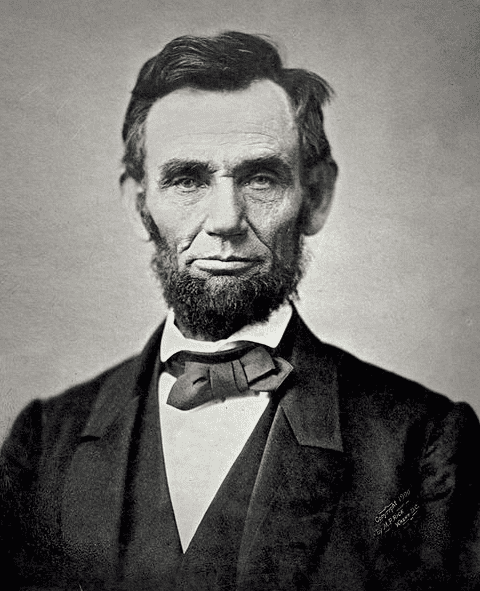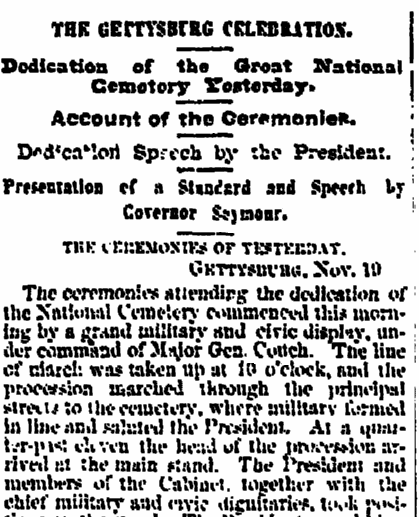On the afternoon of 19 November 1863, President Abraham Lincoln stood to address a crowd of about 15,000 people gathered for the dedication of the Soldiers’ National Cemetery in Gettysburg, Pennsylvania. He followed the main speaker of the day, famed orator Edward Everett, who had just finished delivering a two-hour address that was well-received by the audience. Then President Lincoln spoke for only two minutes, delivering his ten-sentence “Gettysburg Address” that has gained enduring fame as one of the greatest speeches in American history.

Gettysburg Ceremony of 1863
The ceremony that day was in honor of the dead who had fallen at the Battle of Gettysburg the first three days of July 1863, an incredibly bloody battle during the Civil War that ended the Confederacy’s invasion of the North, highlighted by the ferocious attack on the third day known as Pickett’s Charge. More than 7,000 military men and thousands of horses were killed during the three days’ fighting, and their rotting corpses stank in the hot July sun.
The deceased Civil War soldiers had been hastily buried in shallow graves on the battlefield, but 17 acres were later set aside for a proper cemetery, and the bodies were being transferred—Union dead only—to the new cemetery. (The Confederate dead were left in their battlefield graves until 1870-1873, when they were transferred to cemeteries in the South.)
Now, four and a half months after the Gettysburg battle, the cemetery was being dedicated and Lincoln delivered his surprisingly short speech. He had been invited to “set apart these grounds to their sacred use by a few appropriate remarks” and Lincoln’s remarks were few indeed—yet powerful.

Lincoln’s Famous Speech
It is impossible to know exactly what Lincoln said that day. There are five known manuscripts of his speech, but they have differences. Additionally, several newspapers reported the president’s speech, but these accounts all have variations as well. We will also never know how the crowd reacted to his speech. Accounts vary from no applause at all, to only polite applause, to long sustained applause.
Here is how the Albany Journal reported the dedication ceremony and Lincoln’s speech. Its account was based on the reporting of a New York Times reporter; that Republican-leaning paper was careful to note that Lincoln’s short speech was interrupted with applause five times, and claimed it was met with “long, continued applause” at its conclusion. It is interesting to note that not a word of the featured speaker Everett’s speech is quoted, but President Lincoln’s Gettysburg Address is quoted in its entirety.

Here is a transcription of this article:
THE GETTYSBURG CELEBRATION.
Dedication of the Great National Cemetery Yesterday.
Account of the Ceremonies.
Dedication Speech by the President.
Presentation of a Standard and Speech by Governor Seymour.
The Ceremonies of Yesterday.
Gettysburg, Nov. 19
The ceremonies attending the dedication of the National Cemetery commenced this morning by a grand military and civic display, under command of Maj. Gen. Couch. The line of march was taken up at 10 o’clock, and the procession marched through the principal streets to the cemetery, where military formed in line and saluted the President. At a quarter-past eleven the head of the procession arrived at the main stand. The President and members of the Cabinet, together with the chief military and civic dignitaries, took positions on the stand. The President seated himself between Mr. Seward and Mr. Everett, after a reception marked with the respect and perfect silence due to the solemnity of the occasion, every man in the immense gathering uncovering on his appearance.
The military then formed in line, extending around the stand, the area between the stand and military being occupied by civilians, comprising about fifteen thousand people, and including men, women, and children. The attendance of ladies was quite large. The military escort comprised one squadron of cavalry, two batteries of artillery, and a regiment of infantry, which constitutes the regular funeral escort of honor for the highest officer in the service.
After the performance of a funeral dirge by Birgfield by the band, an eloquent prayer was delivered by Rev. Mr. Stockton.
Mr. Everett then commenced the delivery of his oration, which was listened to with marked attention throughout.
Although a heavy fog clouded the heavens in the morning during the procession, the sun broke out in all its brilliancy during the Rev. Mr. Stockton’s prayer, and shone upon the magnificent spectacle. The assemblage was of great magnitude, and was gathered within a circle of great extent around the stand, which was located on the highest point of ground on which the battle was fought. A long line of military surrounded the position taken by the immense multitude of people.
The marshal took up a position on the left of the stand. Numerous flags and banners, suitably draped, were exhibited on the stand and among the audience. The entire scene was one of grandeur due to the importance of the occasion. So quiet were the people that every word uttered by the orator of the day must have been heard by them all, notwithstanding the immensity of the concourse.
Dedicatory Speech of the President.
The President then delivered the following dedicatory speech:
“Four score and seven years ago our fathers brought forth upon this continent a new nation, conceived in liberty, and dedicated to the proposition that all men are created equal. (Applause.) Now we are engaged in a great civil war, testing whether that nation, or any nation so conceived, and so dedicated can long endure. We are met on a great battle-field of that war. We are met to dedicate a portion of it as the final resting place of those who here gave their lives that that nation might live.
“It is altogether fitting and proper that we should do this. But in a larger sense we cannot dedicate, we cannot consecrate, we cannot hallow this ground. The brave men, living and dead, who struggled here have consecrated it far above our power to add or detract. (Applause.) The world will little note nor long remember what we say here, but it can never forget what they did here. (Applause.) It is for us, the living, rather to be dedicated here to the unfinished work that they have for us so far, nobly carried on. (Applause.) It is rather for us to be here dedicated to the great task remaining before us, that from these honored dead we take increased devotion to that cause for which they gave the last full measure of devotion, that we here highly resolve that the dead shall not have died in vain (applause); that the nation shall, under God, have a new birth of freedom, and that government of the people, by the people, and for the people shall not perish from the earth.” (Long continued applause.)
Three cheers were here given for the President and the Governors of the States.
After the delivery of this address, the dirge and the benediction closed the exercises, and the immense assemblage departed at about 4 o’clock.
An online collection of newspapers, such as GenealogyBank’s Historical Newspaper Archives, are not only a great way to learn about the lives of your ancestors – they also help you understand the times your ancestors lived in, and the news they talked about and read in their local papers.
Did any of your ancestors fight in the Battle of Gettysburg or meet Abraham Lincoln? Share your family stories with us in the comments.
Explore over 330 years of newspapers and historical records in GenealogyBank. Discover your family story! Start a 7-Day Free Trial
Related Abraham Lincoln Articles:
